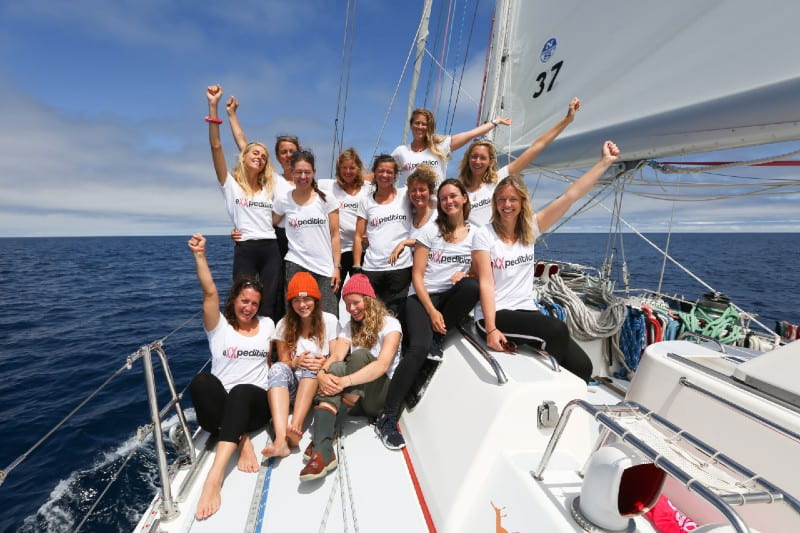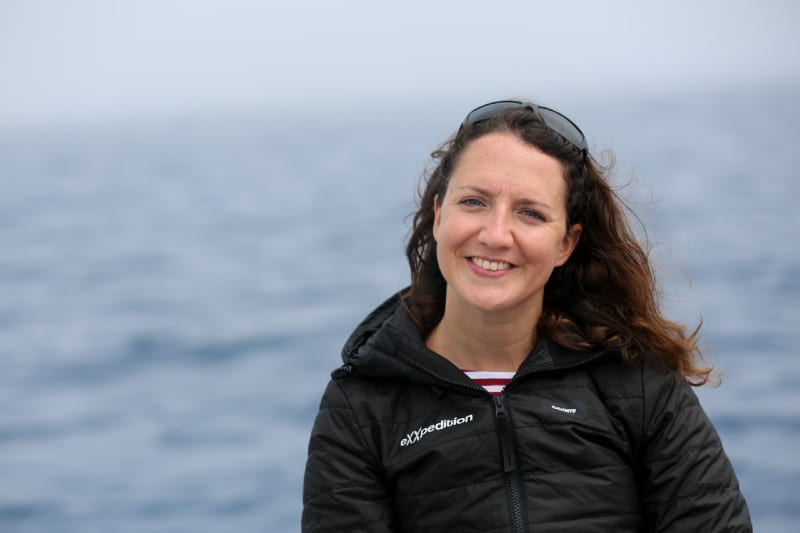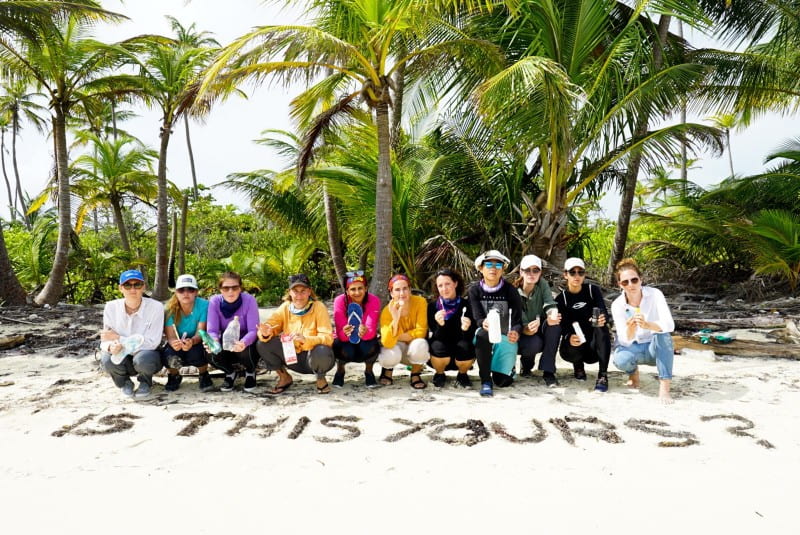 Image credit: Eleanor Church, Lark Rise Pictures – eXXpedition North Pacific Leg 1 Hawaii to Vancouver
Image credit: Eleanor Church, Lark Rise Pictures – eXXpedition North Pacific Leg 1 Hawaii to Vancouver
Sally has always had a passion for our planet, graduating in 2004 with a BSc (Hons) in Geography and then continuing her studies to qualify as a Geography teacher. Over a 12-year teaching career Sally has been department lead and had whole-school responsibility for Teaching and Learning. Whilst teaching in Indonesia Sally led the charge on environmental action, facilitating the school becoming single-use plastic free, and working with the local community to raise awareness about the upstream solutions to this environmental challenge. Sally has since swapped her classroom for a sailing vessel and now leads all-female sailing voyages with eXXpedition, carrying out scientific research into plastic pollution and educating about the issue, the solutions and the role that everyone has to play in overcoming this environmental challenge.
 Image credit: Eleanor Church, Lark Rise Pictures – eXXpedition North Pacific leg 1 Hawaii to Vancouver
Image credit: Eleanor Church, Lark Rise Pictures – eXXpedition North Pacific leg 1 Hawaii to Vancouver
What initially made you want to attend the University of Bristol?
I knew I wanted to study Geography and become a Geography teacher, and Bristol had a great reputation and was known for its academic rigour. But it was when I came to visit for my interview that I got hooked! I was particularly inspired by the Glaciology department – talking to the people who would deliver my lectures swung it for me.
What is your fondest memory from your time in Bristol?
I have two! Getting the opportunity to work as research assistant in Switzerland, living at the foot of a glacier in a tent. For my dissertation I studied the meteorological impact on glacial melts, and I was able to collect some important scientific data while enjoying the camaraderie of a small group of people working on the glacier. And the time I spent as the Student Community Action Coordinator, as a sabbatical officer in 2004-5. It taught me so much about working with different communities and it’s an experience that has stood me in good stead.
How did studying at Bristol help you in your career?
I came to Bristol from a state school and was a bit apprehensive about how I would fit in. But I had the best time at Bristol and was exposed to so many different people and opportunities. Since becoming a Geography teacher I have been able to continue breaking down social barriers. I taught in a school in a deprived area of London, but I was able to instil a belief in my students that they could go on to higher education. My year as a sabbatical officer was also enormously beneficial to me. It taught me a lot about people management and how to get communities to effect change themselves.
What has been the proudest moment of your career to date?
I have moments of pride all the time. My job is often about imparting knowledge to others. Witnessing that ‘lightbulb moment’ when people realise that they can act and make a difference to environmental issues and the protection of our planet makes me very proud.
What is the best career advice that you have ever been given?
Do something you’re passionate about. You’re more likely to succeed if you’re passionate and enjoy it. This also influences the people around you, spreading positive energy. You will find your tribe!
What kind of student were you?
I was very conscientious. I recognised what a privilege it was to study at Bristol and I wanted to do my very best. I was very active, I’m not one for sitting still. I did a lot of volunteering as well as making the most of both the academic and extracurricular opportunities.
Where was your favourite place to spend time in Bristol and why?
One of our course journals could only be accessed in the Earth Sciences Library in the Wills Memorial Building. The place was so old and steeped in tradition and academic rigour that it felt great to be in there. I always felt my studying was more productive there. In addition to that I was also particularly fond of an al fresco lunch on College Green and I enjoyed nights out at the Lizard Lounge, a University staple!
How did studying at the University impact you as a person?
Bristol was a melting pot of different backgrounds and going there was the first time I was exposed to the positivity of diversity, which has influenced my work. This experience helps in my current role with eXXpedition, where my job is to get different perspectives and viewpoints, different voices around the table, talking about what practical steps communities can take in the fight against plastic pollution.
How did you make the leap from Geography Teacher to Environmental Advocate?
When I was teaching in Indonesia I realised the horrific extent of the plastic pollution problem. Plastic rubbish was everywhere. On the streets, the beaches, all over the place. I started to wonder if our plastics from the UK were recycled or just being shipped elsewhere. I used to take my students to the beaches to do clean-ups and we started investigating where all the plastic was coming from. I become convinced that we really needed to look at how we were using plastic. Plastic is not ‘the enemy’ – it is incredibly useful in so many situations, particularly in medical settings – but why are we using it for items that last minutes, such as coffee cups and bags? And I realised that environmental issues are complex, and can include socio-economic factors, such as richer nations shipping waste to poorer ones. I had handed in my notice as a teacher in Indonesia and was waiting to apply for another teaching post when the job with eXXpedition came up and I just knew it was the right role for me. Image credit: eXXpedition / Sophie Dingwall
Image credit: eXXpedition / Sophie Dingwall
What advice would you give to current students or new graduates looking to work in your field?
Well, I don’t have a PhD in Marine Biology, which is what many people in this line of work have. You can go down that academic route, but for environmental action there is a massive interdependence also with social and behavioural science, there isn’t just one route in. If you do know exactly what you want to do, reach out to people doing that job and find out how to get on that path. Do work experience, join local action groups, get involved.
In the face of so many challenges around plastic pollution, what keeps you motivated to continue your work?
The cutting-edge research I get to do. And taking people out on the ocean to experience the issues for themselves. Getting people to recognise their own personal ‘superpower’ and see how that interacts with a solution. When those women get off the boat again and go back to their communities and circles of influence they are bringing knowledge with them and it has a snowball effect. Yes, sometimes the mood on the boat does get low – seeing so much plastic floating out on the ocean can be difficult. But then you see a pod of dolphins and you realise that nature keeps going and it does lift the spirits.
What is your favourite thing about being on the boat?
My favourite thing is being gently woken by a kind colleague with a cup of tea, to get up and do the 4am to 8am watch. There’s great camaraderie and support. You get told whether it’s a sky full of stars or time to put the foul wet weather gear on. It is a quiet, reflective time as usually there’s a lot of activity on board.
How has COVID-19 affected eXXpedition and what are the current plans for your work?
We were out on the ocean when the pandemic really kicked off, so we had to repatriate the team and dock the boat in Tahiti. Our work is now paused for a year, not only because of the pandemic, but because we must consider hurricane season and which ports are open and when. In the meantime, we have launched a website for virtual impact at shift.how. We have done eight legs of the voyage to date, with 80 guest crew on board, spanning around 30 different nationalities, and we have over 100 ambassadors from previous trips. Everyone has a wealth of knowledge and we want to share it. So, for now that’s in the virtual realm.
